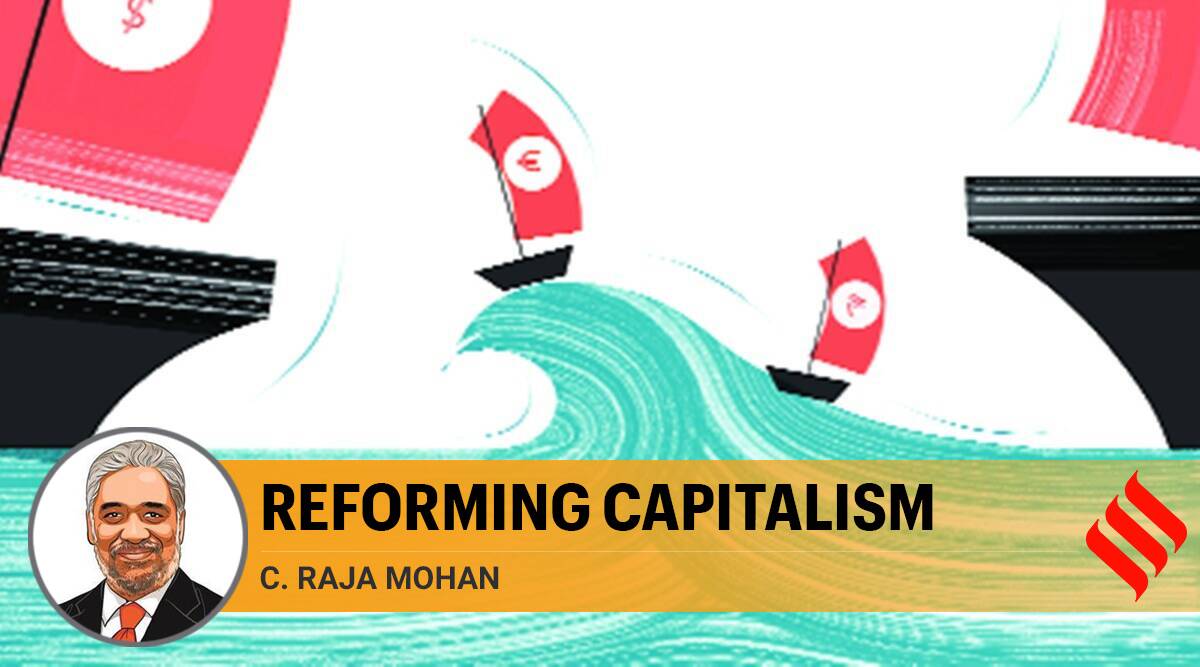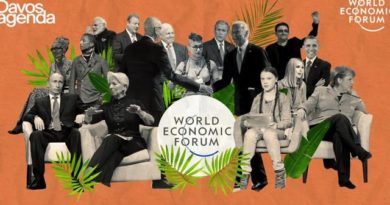WEF’s initiative for ‘The Great Reset’ has set off conspiracy theories on the right and dismissal from the left

Whether it is a clever gimmick or a serious attempt to produce structural changes in the organisation of global capitalism, the World Economic Forum’s initiative for “The Great Reset” has set off furious conspiracy theories on the right and contemptuous dismissal from the left.
The Great Reset, conceptualised by the founder and executive chairman of the WEF, Klaus Schwab, has evolved over the last few years and is based on the assessment that the world economy is in deep trouble. He argues that the situation has been made a lot worse by many factors, including the pandemic’s devastating effects on global society, the unfolding technological revolution, and the consequences of climate change.
Schwab demands that “the world must act jointly and swiftly to revamp all aspects of our societies and economies, from education to social contracts and working conditions. Every country, from the United States to China, must participate, and every industry, from oil and gas to tech, must be transformed. In short, we need a ‘Great Reset’ of capitalism.”
The right sees the WEF arguments about restructuring the global economy as a dangerous attempt to impose “socialism” and dismantle the traditional society, or what remains of it. The left scoffs at the Davos Man’s talk on the crisis of capitalism. It points to the complicity of the Davos forum in promoting policies that have brought the world to the current impasse and question its capacity to produce solutions.
Irrespective of what the WEF might say, there is no denying the contemporary global challenges. The reigning assumptions about deregulation and globalisation that significantly reduced constraints on capital within and across borders over the last three decades are now being challenged across the world, including in the US that long championed these ideas four decades ago.
Delhi, which is in the middle of an economic reset of its own, must not only pay attention to the global debate, but also recognise that the current crisis and its political consequences will inevitably lead to a rearrangement of the global order; Davos or no Davos. If structural change is inevitable, the question is what Delhi can do to maximise India’s possibilities and limit the potential dangers.
Prime Minister Narendra Modi will be among the many world leaders who will be addressing this week’s annual gathering of the WEF. The pandemic has compelled the forum to move online from its traditional wintry abode in the Swiss Alps. But Davos has not given up on a physical meeting for 2021. It is scheduled to take place in June in Singapore.
This is only the second time that the Davos annual forum is taking place at another location. In 2002 January, the forum convened in Manhattan, to demonstrate the resilience and resolve of international capital against the spectacular terror attacks on New York and Washington — the financial and political centres of the post-War global order—on September 11, 2001.
The choice of Singapore is certainly practical; it is also symbolic. The success of East Asia, or “Greater China” if you will, in containing the pandemic stands in stark contrast to the failures in North America and Europe. The only cities that can host large physical events right now are in Asia, and Singapore is arguably the most convenient. Meanwhile, the much-talked-about Asia’s rise — notwithstanding its internal contradictions — is with us and is now a decisive factor in reordering the global economy.
The agenda of The Great Reset touches on many key issues facing the world. Three of them stand out.
First is the question of reforming capitalism. Davos has been at the forefront of calling for “stakeholder capitalism” that looks beyond the traditional corporate focus on maximising profit for shareholders.
The demands for its reform are as old as capitalism itself; we also know that the dominant capital tends to resist change. What is different this time is the vocal support for the principles of stakeholder capitalism from the top honchos of the global industry. In the US, progressives hope President Joe Biden, like Presidents Teddy and Franklin Roosevelt, will bring much-needed reform. Not everyone is convinced though.
Commentary in the Wall Street Journal routinely dismisses stakeholder capitalism as a front for “irresponsible corporatism” that diverts cash flows from productive use of capital that can produce collective good. On the American left, critics argue capital has shown little concern for the interests of stakeholders and its instinct for profit maximisation has only gotten worse during the pandemic.
The large technology companies that were to deliver us into the digital utopia have proven to be as rapacious as the European merchant kings of the early colonial era and exploitative capitalists of the 19th century. Big beneficiaries of deregulation and special concessions around the world, the tech giants pay few taxes and actively depress wages for working people. They also have acquired unprecedented power to influence the governments.
Realists would suggest that capitalism is not going to reform itself. Making capital more responsive belongs to the realm of the state. The kind of policy choices that a state makes in mediating between different stakeholders depends, in turn, on the balance of political forces within societies and between them.
Second, Davos is certainly right to focus on the deepening climate crisis. Climate sceptics have been ousted from Washington and President Biden has rejoined the 2015 Paris accord on mitigating climate change. But that is not enough to resolve the main political challenge on climate change. It is about distributing the economic and social costs of moving away from carbon use within and across nations.
Internally, the conflict is about managing the differential social impact and externally, it is about reconciling the divergent carbon policy imperatives among the major economic actors. This again leads to the realm of contested politics — both internal and international.
Third is the growing difficulty of global cooperation that Davos wants to promote. The era of great power harmony that accompanied the liberalisation of the global economy at the turn of the 1990s has yielded place to intense contestation. The contestation is not just political but increasingly economic and technological. If the world needs universalist solutions, getting them has become harder than ever before. This, in turn, might lead to “competitive multilateralism” and the construction of coalitions of the willing, capable to develop and enforce new rules.
Unlike in the 20th century, India now can and must actively contribute to the framing of new rules to govern global capitalism and reshaping of international institutions. At the same time, it must also reform its own economy and society to make it more equitable, sustainable and capable of coping with rapid external change. It is only those nations that can effectively manage the dynamic interaction between the internal and external that will come out as winners in the Great Reset that is unfolding.
This article first appeared in the print edition on January 25, 2021 under the title ‘Reforming capitalism’. The writer is director, Institute of South Asian Studies, National University of Singapore and contributing editor on international affairs for The Indian Express.
*** This article has been archived for your research. The original version from The Indian Express can be found here ***


